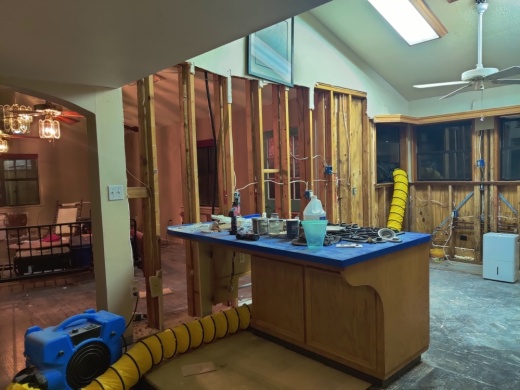Piper, who owns Natural Living Food Co-op & Cafe in League City and purchased a Bacliff house a year ago, said she and her family began experiencing nausea, migraines, exhaustion and other symptoms.
“In early summer, all of our health started to change a bit, and we weren’t really paying attention to what it was,” she said.
After researching, Piper thought the symptoms could be due to mold in the house. In the fall, a home inspector confirmed her suspicions, Piper said.
“Who ... would ever think their house is making them sick?” she said.
Professionals eventually made it to the house to begin to tear out mold-infested walls. As it turned out, every wall of every room had thick, black mold behind it, basically making the house uninhabitable, Piper said.
Piper suspects the house flooded during Hurricane Harvey and was not properly dried out, leading to the mold growth.
Homeowners insurance does not cover mold growth in Texas, and the Pipers do not have health insurance, leading to financial problems. Additionally, the family had to throw out 90% of their belongings due to fears they may be infested with mold, Piper said.
“We’re losing everything—I mean everything,” she said.
Today, Piper and her family are staying with friends while Piper’s husband lives in a tent in the yard of the house to keep an eye on it. The house will stand while the family litigates.
Bob Phalen, University of Houston-Clear Lake associate professor and chair of its occupational safety and health program, has a professional history as an industrial hygienist. He said he has not seen a case as extreme as the Pipers’ but that mold can be dangerous.
“I’ve done assessments where people got pretty sick, but it was mostly nausea, vomiting,” he said.
Phalen said he worked a case in which dockworkers were getting sick opening shipping containers that held mold-infested pallets. Some ended up in the hospital, he said.
Mold typically affects respiratory systems, causing coughing or allergic responses. Those who have asthma can see it worsen due to mold, and mold can sometimes even cause infections in people, Phalen said.
That said, mold is everywhere, and if you are sampling for it, you will find it, Phalen said.
Phalen suspects mold can be potentially more prevalent in the Greater Houston area, considering it is hot, humid, and prone to rain and floods. With the February freeze causing hundreds of homes’ pipes to burst, if residents did not properly dry out their houses, mold could be a future problem, Phalen said.
“If there was water damage, any porous material needs to be removed—anything that was wet,” he said.
Piper urged residents to be vigilant, especially if they took on water during the freeze.
“Mold inspections are extensive, but they are worth every dime,” she said.





